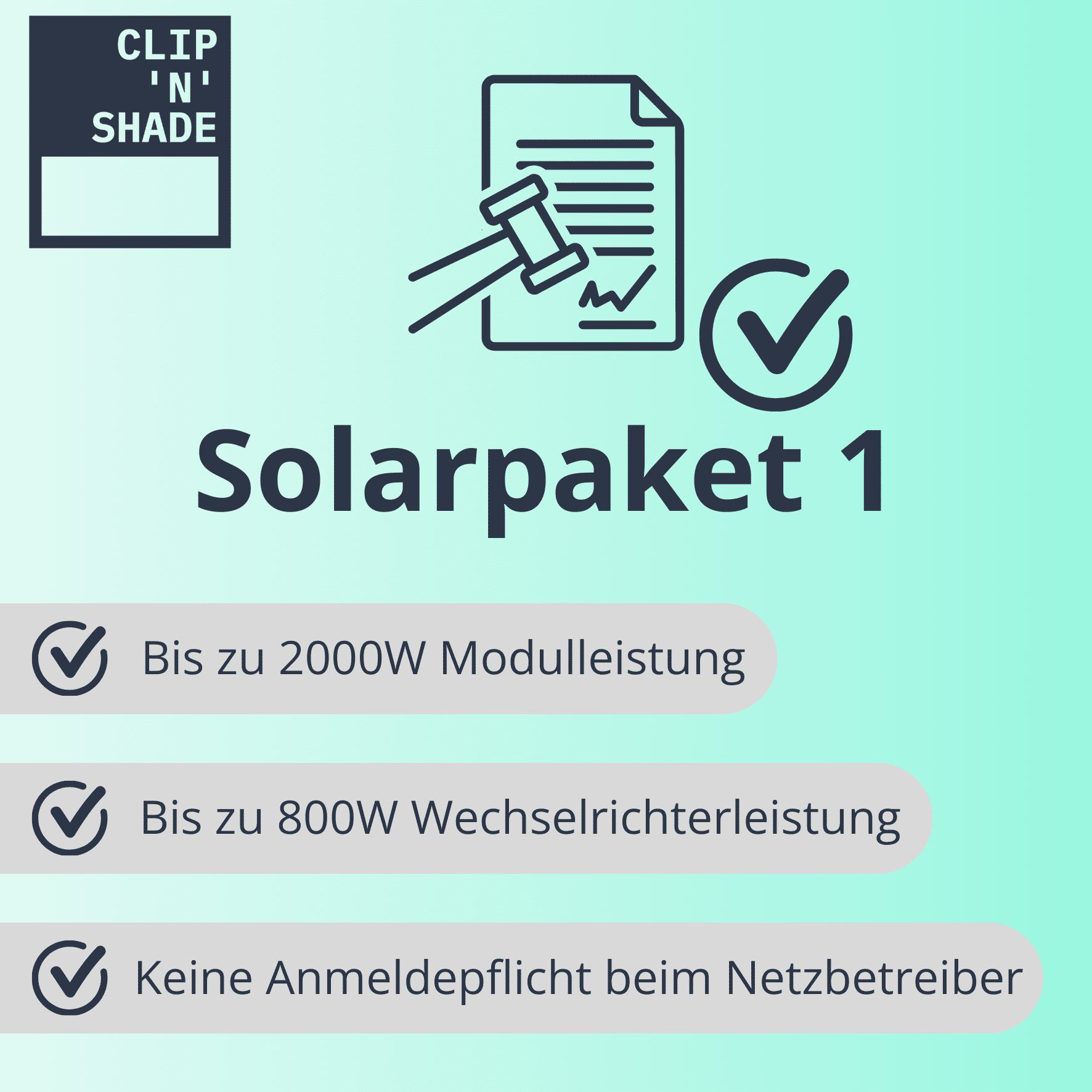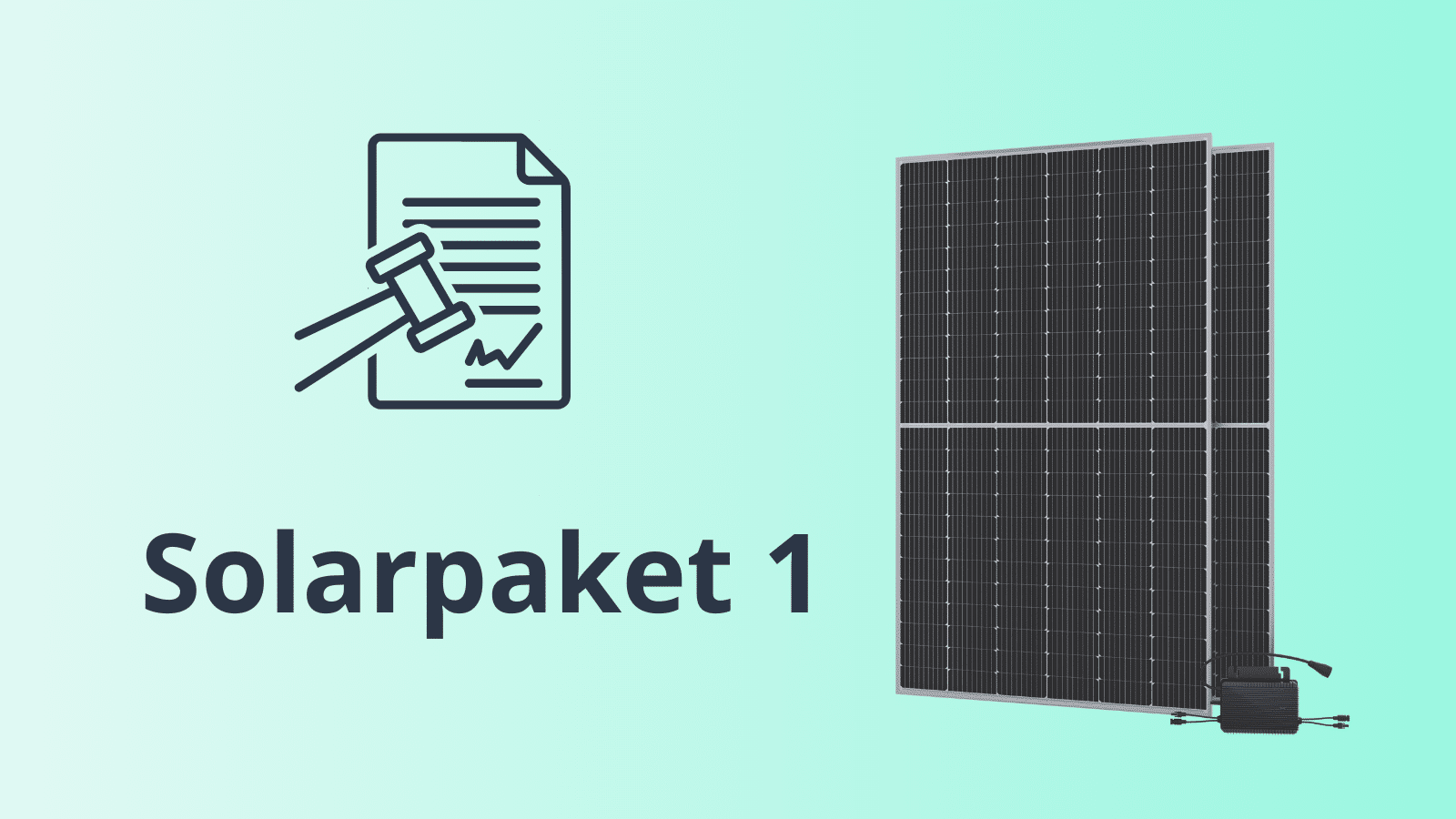
Solar package 1 at a glance
Many simplifications for balcony power plants!
- Entered into force on 16/05/2024
- Inverters with an output power of up to 800W are permitted
- The PV modules connected to the inverter should now have a total output of 2,000 Wp.
- It is no longer necessary to register with the network operator
- Online registration with the Market Master Data Register has been greatly simplified
- Reverse-running (Ferraris) electricity meters are permitted
Balcony power stations are small, plug-in photovoltaic systems that can be installed on balconies, terraces or house walls. They usually consist of one or two solar modules and an inverter that converts the direct current generated into standard household alternating current. Previously, these systems were limited to a maximum output of 600 watts, and registering them with grid operators and complying with various technical requirements often presented bureaucratic hurdles.
The German government recognised the need to remove these barriers in order to make the use of balcony power plants more attractive and promote their spread. Solar Package 1 reduces these barriers and improves the framework conditions for wider acceptance and utilisation.
The innovations in the Solar package 1
One of the most important changes in the Solar package 1 is the Increase the maximum output for balcony power stations to 800 watts. This increase in output enables users to produce more electricity themselves and thus further reduce their electricity costs. The increase in output is a significant step that considerably increases the attractiveness of these systems.
In addition, the German government has Simplified registration and commissioning processes. Previously, it was necessary to register balcony power plants with the local grid operators and fulfil various technical requirements. With the new solar package the reporting obligation does not applyand the Registration is facilitated by standardised and simplified processes. These measures reduce the bureaucratic effort and make the installation and utilisation of balcony power plants much less complicated.
Benefits for consumers and future prospects
The innovations in the Solar package 1 bring numerous advantages for consumers. One of the most obvious advantages is the cost savings resulting from the increased self-production of electricity. With an output of up to 800 watts, balcony power stations can cover a significant proportion of a household's electricity requirements, resulting in a noticeable reduction in electricity costs.
In addition, balcony power stations promote independence and sustainability in private households. Users can cover part of their energy requirements themselves and are less dependent on the major energy suppliers. This not only helps to stabilise electricity prices, but also makes an important contribution to climate protection.
The simple integration and use of Balcony power stations is another advantage. Modern systems are often designed as plug-and-play systems that can be installed and operated without extensive technical knowledge. This makes them particularly attractive for tenants and homeowners who want to take their energy supply into their own hands.
In the long term, the Federal Government is pursuing the Solar package 1 The aim is to further expand the use of renewable energies and drive forward the energy transition. The promotion of balcony power plants is an important component of this strategy. The new regulations and subsidies are intended to significantly increase the spread of these systems, which can contribute to a sustainable and decentralised energy supply.
Further developments and innovations in the area of balcony power plants can be expected in the future. Technological advances could further improve the efficiency and performance of these systems. In addition, new business models and services relating to balcony power plants could emerge, offering users additional incentives.
Conclusion
The German government's new Solar Package 1 brings decisive simplifications and advantages for balcony power plants. The increase in the maximum output to 800 watts, the simplification of the registration and commissioning processes and the introduction of new subsidy programmes make these small photovoltaic systems more attractive and accessible. Consumers can thus not only reduce their electricity costs, but also make an active contribution to climate protection. With these measures, the German government is sending a clear signal in favour of promoting renewable energies and supporting the energy transition. Anyone who has the opportunity should take advantage of the opportunities offered by balcony power plants and thus take an important step towards a sustainable and environmentally friendly energy supply.







